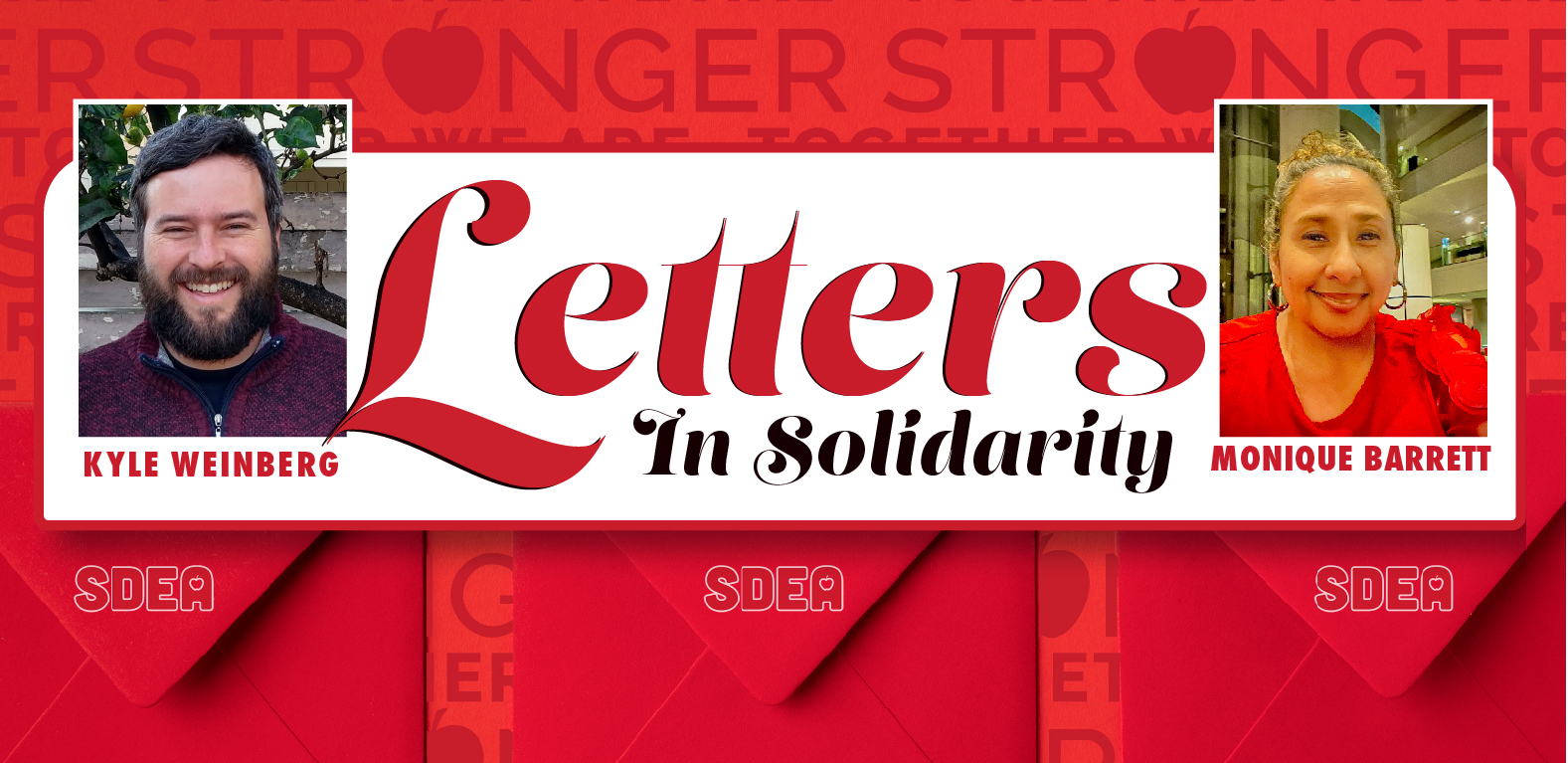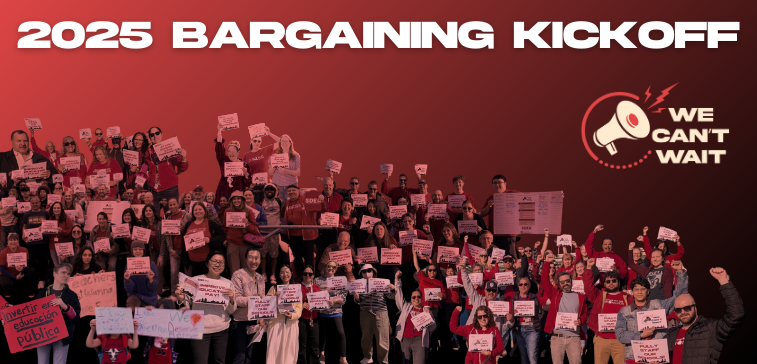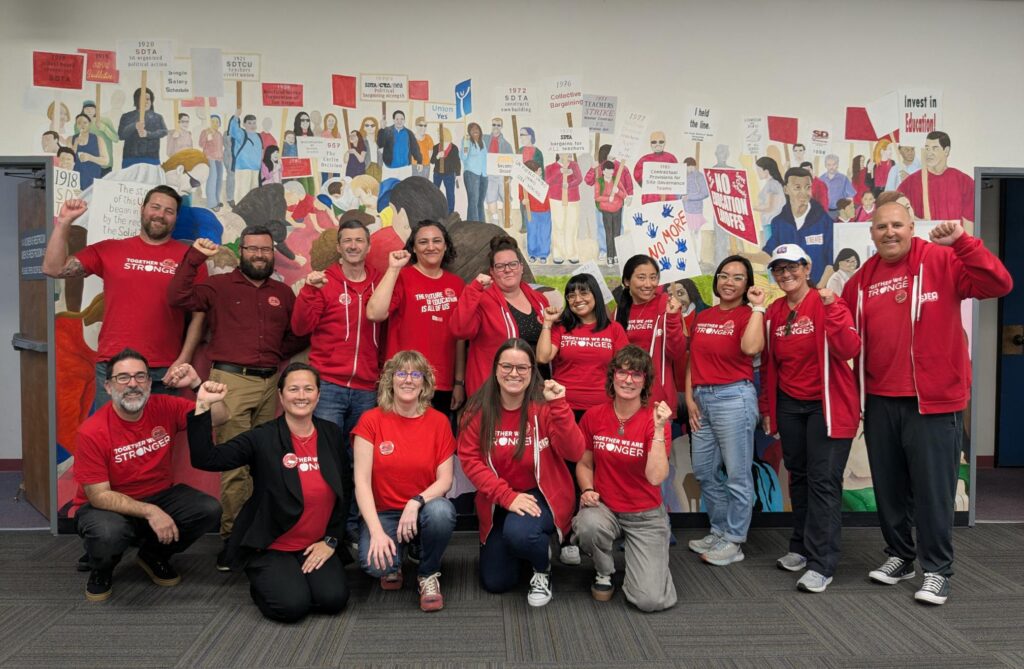Last Call for Elective Session Presenters - CTA Summer Institute, IPD Strand
The CTA Instruction and Professional Development (IPD) department is looking for presenters for our IPD Strand at the 2025 CTA Summer Institute. The theme of the IPD Strand will be “Creating Safe and Supportive Classrooms for Students and Educators II,” revisiting and expanding on the theme of our popular 2024 IPD Strand. APPLICATIONS DUE MONDAY, MARCH 24, 2025: bit.ly/IPDpresenter25
The 2025 CTA Summer Institute will run from Wednesday, July 16 to Sunday, July 20, 2025, at the Westin Bonaventure hotel in downtown Los Angeles. On Thursday, Friday and Saturday, we will start the day with keynote speakers and panels focusing on a different aspect of safe and supportive classrooms, followed by elective sessions each day in the afternoon. We are looking for member-led elective sessions that will complement each day’s keynote focus. We typically draw on classroom teachers as presenters for our elective sessions because of their practical classroom experience, but this year’s theme offers an opportunity for members who work as counselors, psychologists, behaviorists, social workers, nurses, and educators working with student and teacher support programs to showcase their best practices as well. Sample ideas for possible afternoon electives are included below. Feel free to develop one of the ideas provided or propose an idea of your own.
- Building deep relationships with students and families
- Classroom management strategies
- At-risk/at-promise practices in classrooms and schools
- Alternatives to punitive and exclusionary discipline
- Restorative Justice/PBS/MTSS programs that support students BEFORE they get to the point of discipline/suspension/expulsion
- Strategies to support and promote attendance
- Chapters organizing around equity and justice in discipline & safety
- Self-regulation strategies for students and adults
- Behavior interventions consistent with child/adolescent/teen neurology/biology
- Trauma-informed practices in classrooms and schools
- Strategies that support social and emotional learning and well-being
- Classroom systems and structures that support all students
- Instructional models that support all students (including UDL)
- Campus-wide systems and structures that support students
- Continuation schools as alternative supportive settings
- Systems and structures that support adults
- Chapters organizing around academic issues and safety/support issues
- Community schools as a vehicle for safe and supportive schools/classrooms
Elective sessions will be 90 minutes each, although we’re not looking for 90 minutes of lecture; instead, a mix of content, discussion and time for participants to engage with the content would be ideal. Please keep in mind that we need to offer elective options that will appeal to elementary and secondary teachers (as well as, ideally, preschool and community college teachers), and general education teachers, special education teachers, and other student support professionals.
For selected elective session presenters, the IPD department will pay for 2025 CTA Summer Institute registration for the IPD Strand (full conference), including meals and a single occupancy room in the Westin Bonaventure hotel, and travel (car mileage or an economical flight + taxi/shuttle/Uber/Lyft to and from the airport).
If you are interested in presenting an elective session as part of the IPD Strand at the 2025 CTA Summer Institute, please complete and submit the following interest form by Monday, March 24, 2025, including:
- Presenters' names, home email addresses, and current assignments
- Proposed session title
- What grade levels and settings your session would be appropriate for
- Description of the proposed session
- Any limitations on your availability July 16-20, 2025
Link to form: https://bit.ly/IPDpresenter25
The IPD team will review all interest forms submitted by the deadline and select elective sessions reflecting a range of topics and audiences. Presenters will be notified in April. If you have any questions, please contact Brian Guerrero (bguerrero@cta.org) in the CTA IPD department.
Letters in Solidarity: Fighting for Equity & Support for Our Students

Fighting for Equity and Support for Our Students
As SDEA union educators, we serve the highest-need student population in the county. We know that in order to set our students up for success, we need to address the needs of the whole child inside and outside the classroom. Advocating for the well-being of our students has been a guiding principle for SDEA elected leaders from schools and programs throughout the district as we have voted to adopt several policies in recent years that have oriented us as a fighting, social justice union.
With the constant threats by the new federal administration to target our most vulnerable students and communities, the impact of politics on our schools is undeniable. As a union, we could choose to sit on the sidelines, hoping that more humane values eventually prevail. Our SDEA Board and Representative Council, however, have set us on a path to not acquiesce to the status quo and to instead organize together with union and community allies to secure protections and supports that advance equity and human rights.
We took on this mission when we ratified our contract bargaining platform and collectively committed to fight for the 3 pillars in our statewide We Can’t Wait campaign: fully-staffed schools, improving our pay and stability for our students and communities. Locally, we are building on our history of successful community demands campaigns where we as union educators have joined with families and other members of our education justice coalition to win agreements on community schools, stronger shared decision-making, and affordable housing.
This year, guided by the feedback provided through our SDEA bargaining input process and by coalition partners, we honed in on expanded housing and mental health supports as the community demands for our campaign. At our first bargaining session on February 27, we proposed a new equity article in our contract that includes solutions to address the housing crisis in San Diego that is contributing to declining student enrollment. We also proposed a 10% combined salary increase by 2026 so that we can continue to afford to live near the schools where we teach.
These proposals by the SDEA bargaining team were backed by walk-ins across SDUSD as we chanted, shared our contract campaign platform with families and added signatures to petitions with our demands for the schools our students deserve. Through the participation of thousands of SDEA union educators in our collective actions, we are building the power needed to get the district to prioritize resources for our students and also send a unified message to decision-makers up and down the state that Now Is The Time to reverse decades of disinvestment in public education in California. We Can’t Wait!

2025 Bargaining Kickoff

Last week, SDEA members started bargaining for a stronger union contract, demanding fully staffed schools, improved educator pay, & stability for our students. Union educators all over California are also beginning bargaining and gathering community support as part of the statewide We Can’t Wait campaign.
Educators, families, students, and community members showed up #UnionStrong last week!
SDEA members at schools across the District held rallies and walk-ins last week to show solidarity, raise awareness as bargaining began, and gather community support for the fight ahead. Everyone signed giant community petitions in support of the We Can’t Wait platform, and then walked in together in solidarity. See some highlights from across the District:
https://youtu.be/kSSGMZJUbC0
At the bargaining table, SDEA members proposed improvements to pay and stability.
SDEA members on the Bargaining Team met for the first session on February 27, 2025, where they presented 19 proposals focused on improving pay and stability for students and communities - two of the three goals that educators across the state are currently fighting for. Here in San Diego Unified, that means proposals of future and retroactive raises, better benefits and leave policies, equitable compensation for extra work, no more layoffs for the duration of this contract, and a new equity article with protections for our students and educators who are currently targeted by federal policies and threats. Our next bargaining session will be on March 27, when proposals will focus on fully staffing schools. Read the full bargaining update sent to all members after the session, and keep track of more information on the We Can't Wait bargaining information hub.

What’s next?
As bargaining continues, SDEA members will continue building their site-based union power with rolling pickets starting in late April. Make sure to attend your next union meeting to find out more! With daily threats to federal funding in the news, it’s clear that this won’t be an easy fight. It’s more important than ever to advocate for public education, and to bring along families and community members to join us in our fight!
Dream Big: Fund your projects with an IFT Grant!

Did you know that union membership can help fund innovative projects in your classrooms and schools? CTA’s Institute for Teaching (IFT) Grants are a key part of the IFT’s mission to support public educators, students, and communities. These funds help educators turn big ideas into real impact, and are available to all SDEA members as part of our statewide affiliate. Could your classroom or school be next?
See these grant funds in action:
$20,000 is currently fueling a leadership program at Morse High School
SDEA members Maria Miller and Sonja Taylor received a $20,000 grant for their project, “Black and Brown Girls United to Heal” at Morse High School. Their project addresses the underrepresentation of young girls in leadership positions, and provides a program full of leadership development opportunities for girls to develop confidence, self-esteem, a stronger sense of belonging, and leadership capacity. Participants were invited through a collaboration with Morse’s counselors, Restorative Justice Coordinator, and Wellness Center Coordinator. This project is still ongoing, and the participants are holding a “Glow & Grow Gathering” event as a culmination of the project on Saturday, May 10th - RSVP if you’d like to attend and support!
“CTA really wants to provide educators access to resources to make projects come true,” said Maria Miller. “No project too small or too big! Educators have permission to dream without limits for students.”

$20,000 helped kick off a School Garden & Comprehensive Health and Wellness Program
SDEA member Emalyn Leppard got an IFT grant for Montgomery Middle STEAM Magnet School’s Comprehensive Health & Wellness Program - most recently, a $20,000 grant for the 2018-19 School Year to build on previous grants. This funding helped the Health & Wellness Program grow into a thriving collaboration of parents, teachers, university students, and community partners, which is still ongoing long after the initial grant period. Funds were used for a school garden, aquaponics system, and revitalized school kitchen, so students could grow and cook healthy meals, see real-world examples from their math and science lessons, and participate in monthly Family Dinner Nights to celebrate diverse cultures through food.
See the school garden and Family Dinner Nights in action in this 2 minute video:
https://www.youtube.com/watch?v=gU1ChVr7m1A
Today, Emalyn is “semi-retired,” but still involved in the school garden (now named after her!) as a Visiting Teacher and as a support for teachers and college interns. She’s also a garden coordinator at the Sage Garden Project, which funds and supports garden and cooking programs for elementary schools - not just as electives or after-school programs for a few students, but as comprehensive programs for every kid during the school day, run by trained (and compensated) educators. She’s a fierce advocate for school gardens for everyone, including advocating at the state level where SB 341 was recently introduced to support school gardens all over California.
“IFT grants were a game changer,” said Emalyn Leppard. “Dream big! If you’ve ever wanted to do something outside the box, this funding makes it so easy to follow that dream. You don’t have to submit requests through the District, and SDEA does all the bookkeeping so you get reimbursed quickly. I was able to pay stipends for a team, including a retired credentialed teacher to help run the program and a community member to help make connections to families who I wasn’t able to connect with on my own.”
Read CTA’s highlight of Emalyn Leppard and this project!

Follow the Montgomery Middle School Community Garden on Facebook to see the ongoing garden!
What could an IFT grant fund in your classroom or school?
What big dreams do you have for your classroom or school? Could these dreams become a reality with the support of funds from an IFT grant?
Applications are still open for Institute for Teaching (IFT) Grants to fund projects in the 2025-2026 school year. The deadline is March 31, 2025. Learn more and apply at cta.org/ift-institute-for-teaching.
Grant opportunities include:
- Environmental Education Cohort (NEW!): Up to $5,000 (Environmental Educator Grant) or $20,000 (Environmental Impact Grant) for projects focused on environmental education, plus networking opportunities and an in-person convening!
- Educator Grant: Up to $5,000 for individual educators to impact a classroom or group of students.
- Impact Grant: Up to $20,000 for teams of two or more educators (three recommended) to make an impact across multiple classrooms or school sites.
Get inspiration & support:
Not sure what this funding could look like in your school or classroom? Check out more examples of projects funded for the 2024-25 school year and the 2023-24 school year.
You can email ift@cta.org with questions, and check out the IFT website for lots more information (including an opportunity to schedule a one-on-one meeting to brainstorm with a Grant Project Coordinator!)
Know Your Rights: Salary Advancement

Know Your Rights: Salary Advancement
 With a high cost of living in San Diego and teacher pay that continues to lag behind other professionals, it’s important to ensure you are getting all the compensation you are entitled to!
With a high cost of living in San Diego and teacher pay that continues to lag behind other professionals, it’s important to ensure you are getting all the compensation you are entitled to!
Do you know your hourly rate for additional pay beyond your contracted duties, and your eligibility for additional stipends? Did you know that you have access to free professional learning that can advance you on the salary scale?
Learn more in our new Know Your Rights flyer!
Additional opportunities in Special Education
Considering adding a Special Education credential? The recent Supplemental Early Retirement Program (SERP) agreement includes a pathway to credentials to offset the number of Ed Specialist vacancies that occur due to the SERP by reimbursing unit members – including Visiting Teachers – for the cost of obtaining an Ed Specialist credential while they continue working.
See more Know Your Rights flyers and resources here!
Bargaining Update - February 27, 2025

As SDEA members begin negotiations for our next contract, we’re not just bargaining for a stronger local contract. We’re also uniting our efforts with more than 30 other unions across the state to demand better funding for public education.
In our first bargaining session, SDEA members on the Bargaining Team focused our proposals on improved educator pay and stability for our students and communities. Read more about our 19 proposals below, and see the entire list of articles we proposed.
Almost all of our proposals come with price tags, so starting with conversations about pay is important - and not just because we live in one of the most expensive cities in the country.
Future & Retroactive Raises:
We proposed three raises for SDEA members:
- A 2% raise for our current school year, retroactive to July 1, 2024. Last year, we agreed to revisit wages once the state budget was finalized. Now that we have the numbers, we can push for the best possible raises, including retroactive pay for this current school year.
- A 4% raise beginning July 1, 2025 and another 4% increase as of July 1, 2026, which would apply to salary schedules for all unit members.
Besides proposing these percent wage increases, we proposed that members get credit for a wider range of experiences when initially placed on the salary scale. We also proposed more equitable pay for additional work beyond contracted duties, so that all members are compensated for all their work. We proposed a stipend for Bilingual and Dual Immersion teachers to compensate educators for the additional work of dual language settings and to incentivize the hiring of educators who reflect our students’ diversity. Additionally, we have proposed a significantly higher $4000 stipend for Special Education teachers to incentivize filling persistent vacancies and compensate educators for consistent work outside regularly contracted hours. (This is only one small part of our planned proposals for Special Education Staffing - the majority of proposed changes to SPED will be to Article 29, which we plan to present in March.)
Read all proposed changes to Article 7: Wages and the Salary Schedule & Rules in Appendices A-G, to see the relevant changes for your position.
Benefits & Leaves:
We proposed a variety of improvements to benefits and leaves to meet the needs of members and their families and to ensure our District can retain educators throughout a variety of life changes, including an increase of up to 12 days of personal necessity leave that can be used each school year. We additionally proposed up to 14 weeks of expanded and more flexible leave for pregnancy, increased partner/adoption leave, and priority enrollment in before- and after-school programs for SDEA members’ children. Read all proposed changes to Article 9:Benefits and Article 10: Leaves.
Visiting Teachers:
Visiting Teachers are full members of our bargaining unit and receive all negotiated percentage raises outlined in Article 7 (Wages.) We are pushing for meaningful improvements to Visiting Teacher pay in particular, considering that the District recently reverted to the contracted daily rate following the expiration of temporary COVID-era increases. Our proposals include increased rates for long-term and Special Education assignments, and the addition of a "Contracted Visiting Teacher" role that would be eligible for benefits. Read all proposed changes to Article 32: Visiting Teachers and Appendix D: VT Salary Schedule & Rules.
We’ve seen our schools destabilized by bare-bones staffing, the unnecessary chaos of threatened layoffs and fall transfers, and federal policies that target our most vulnerable students and communities. We submitted a variety of proposals to bring stability to our school communities, including:
- NO layoffs during the term of this contract. We simply can’t afford to talk about cuts when our schools are already understaffed. Read all proposed changes for Article 19: Layoff & Reemployment.
- An expanded Equity article that builds in extra protections and supports to counter ongoing threats to our most vulnerable students and educators. Read all proposed changes for the repurposed Article 35: Equity and Support for Students and Communities.
- An agreement to advocate together with district leadership for increased state and federal funding for our schools. Read all proposed changes for Article 34: Revenue for Public Education.
- Revised discipline procedures so that the District disciplines members only for just cause and through clear and progressive steps. Read all proposed changes for Article 33: Discipline.
An ongoing commitment to maintaining safe and clean school facilities. Read the proposed adjustment to Article 11: Safety.
Stay Informed:
- See the list of all proposals presented today and read the full text of each proposal in our proposal tracker.
- Our next bargaining session is scheduled for March 27, 2025. See all the articles we will propose changes to during this year’s bargaining, and our bargaining proposal tracker to keep track of ongoing negotiations.
- More information: We Can't Wait Bargaining Information Hub
In Solidarity,
SDEA’s Bargaining Team
Kyle Weinberg, SDEA President, Laurie Bailon, Restorative Justice Teacher, Bell MS; Carly Bresee, Ed. Specialist: Moderate/Severe, Perkins K-8, Sarah Darr, SDEA Secretary, WCW Campaign Organizer & Senior SLP; Christina Gallegos, ECSE Teacher, Rodriguez ES; Candace Gyure, School Nurse; Stacy Hernandez, SDEA Bargaining Chair & 2nd Grade Teacher, Dailard El.; Andrew Melia, School Psychologist, Riley School; Elizabeth Miller, Ed. Specialist: Mild/Moderate, Lewis MS; Eri Nall, Head Counselor; Kiki Ochoa, History and Ethnic Studies Lead Teacher, Lincoln HS; Lori Schmersal, PE Teacher & Coach, Clairemont HS; plus SDEA staff Anthony Saavedra, Executive Director, and Sara Holerud, Organizer

NEA Representative Assembly: SDEA members running as State Delegates
The National Education Association Representative Assembly (or NEA-RA) is the highest decision-making body within the NEA, and is the world’s largest democratic deliberative body. Every year, RA delegates debate the vital issues that impact American education and establish policy for the year ahead. It’s more important than ever that SDEA educators are represented.
All SDEA members should have gotten an email to personal email on file with CTA, with the subject “2025 NEA RA State Delegate Election.” Please exercise your democratic right to vote and consider voting for SDEA candidates who are running as state delegates for NEA RA:
- Paula Carmack
- Jared Enyart
- Shaquanna Haile
- Meghann Hughes
- Kimberly Allard
- Maria Miller
- Vinita Rajah
- Norma Reyes
- Maria Romano
- Sarah Darr
- Monique Barrett
- Kisha Borden
- Shane Parmely
- Augustus Phiasivongsa
- Stacy Williams
- Molly Beth Stewart
The 2025 NEA Representative Assembly will be held in Portland, OR, from July 2-5, 2025.
Note: The views and opinions expressed are those of the candidate and not necessarily those of CTA and NEA.
VEBA Dependent Eligibility Audit - 2025
Every five years, SDUSD is required to verify that all dependents (including spouses and domestic partners) enrolled in our healthcare plan are eligible for coverage. VEBA manages our healthcare benefits and will be conducting this audit, so keep an eye out for a letter - the District has let SDEA leaders know that it will be sent soon. This audit is important to keep your family’s benefits, so make sure to respond by following the instructions you receive!
Fixing elementary prep time issues: Agreement reached
Scheduling elementary prep time has been more complex this year, with the contractual right to at least 180 minutes of prep time every two weeks and the addition of VAPA teachers funded by Prop 28. The Joint District-SDEA Elementary Preparation & Enrichment Committee has been working to address these challenges.
This year SDEA members have reported a variety of issues, including:
- Not enough prep teachers allocated at some sites
- Vacancies even when prep teachers are allocated, leading to missed prep time
- Fully staffed sites struggling to reschedule missed prep due to holidays or other disruptions
Recently this joint committee agreed on a solution:
- Visiting Teachers will cover any missed prep time before the end of the school year. They may follow pre-planned PE lessons, eliminating extra prep work for educators (so that they can use prep time to actually prep!). If you are owed prep time, reach out to your site administrator to start this process now!
- When a site is fully staffed, a schedule analysis will help determine whether enrichment teacher allocation adjustments are needed at sites with ongoing scheduling challenges.
This will ensure that all educators can receive their full prep time, including make-ups, as intended.
- Read the whole agreement here
- Read more about the Elementary Preparation & Enrichment Program (including an FAQ)
Letters in Solidarity: This is Why - We Can't Wait.

If we don’t act now, on behalf of our students, educators and schools when will the time be right? We can’t wait any longer.
We can’t wait – for adequate school staffing.
We can’t wait – for our schools to have sufficient resources.
We can’t wait – for schools to be safe and stable.
We can’t wait - for Washington to get its act together or for the next election.
We can’t wait - California’s students deserve better.
Although we live in the fifth largest economy in the world, California ranks in the bottom half of states for per-student funding. It’s unacceptable that in the “Golden State,” with its vast wealth and resources, we struggle to fully staff our schools. It is shameful that four out of five educators cannot afford to live near their school and the pay gap between educators in California and other professions grows ever wider. This is why San Diego Unified has an educator recruitment and retention crisis.
There are 93 schools in our district where special education teachers have student caseloads that exceed contractual limits. We are stretched thin and are unable to get our students the support they need. Burned-out educators and underserved students deserve real solutions.
This is why SDEA is coming together with union educators across the state to organize the We Can’t Wait campaign. On February 4, we joined our colleagues in Los Angeles, San Francisco, Oakland, Sacramento, San Jose, Anaheim and two dozen other school districts across the state to kickoff bargaining for our shared demands. We are calling on our districts to prioritize resources for our students and calling on the state to improve school funding so that California regains its status as the national leader in public education.
77,000 educators, in 32 California school districts, serving 1 million students, are joining with parents, students and communities, raising common issues, refusing to accept excuses, for the first time aligning shared demands and union contract expiration dates, driving a hard bargain with our districts and the state government, can force change -- now.
This month, SDEA members will be joining classified staff, families and community organizations for walk-ins at every school to support our bargaining team and stand up for our shared priorities. Ask your school’s elected SDEA leader for more information on our next collective action! Especially with the looming threats of cuts by the new federal administration, it’s even more urgent that we unite with local allies and education unions across the state to coordinate our campaign for fully staffed schools, improved pay, and stability for students and communities.
Let’s fix this.
Now is the time. We can’t wait.







